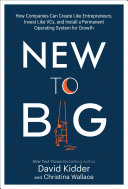

The book emphasizes the necessity of adopting a growth mindset for entrepreneurs and innovators. This mindset fosters resilience and adaptability, allowing individuals to embrace challenges and learn from failures. In a rapidly changing market landscape, a growth mindset encourages continuous learning and experimentation, which are crucial for transitioning from a startup phase to a more established business. The authors argue that this mindset not only influences individual behavior but also shapes company culture, driving teams to innovate and push boundaries. By understanding that skills and intelligence can be developed, leaders can cultivate an environment where creativity thrives, ultimately leading to successful scaling.
Continue readingOne of the core themes of 'New to Big' is the necessity of establishing a scalable business model. The authors detail how startups can begin with a small idea but must develop a framework that allows for growth without a corresponding increase in costs. This involves identifying key metrics that drive growth, understanding customer acquisition costs, and optimizing operational efficiencies. The book outlines various strategies for scaling, such as leveraging technology and automation, which can help businesses manage larger volumes of transactions or customers without a linear increase in resources. This foundational concept is vital for any entrepreneur looking to transition from a small operation to a larger enterprise.
Continue readingTechnology is portrayed as a vital enabler for scaling businesses effectively. The authors discuss how leveraging the right technology can streamline operations, enhance customer experiences, and provide data-driven insights that inform strategic decisions. They highlight examples of companies that have successfully utilized technology to scale their operations, emphasizing the importance of selecting tools that align with business objectives. Furthermore, the book addresses the need for a digital-first approach in today’s marketplace, where consumers increasingly expect seamless online interactions. Entrepreneurs are encouraged to embrace digital transformation as an integral part of their growth strategy.
Continue readingA key takeaway from 'New to Big' is the significance of a customer-centric approach in the scaling process. The authors argue that understanding customer needs and preferences is essential for developing products and services that resonate with the target audience. They advocate for continuous customer feedback loops and iterative product development, which allow businesses to adapt offerings based on real user experiences. This focus on the customer not only aids in retention but also drives word-of-mouth marketing and referrals, which are crucial for organic growth. The book provides practical frameworks for gathering customer insights and integrating them into business strategies.
Continue readingThe authors highlight the value of strategic partnerships and collaborations in accelerating growth. They discuss how forming alliances with other businesses can provide access to new markets, resources, and expertise that may not be available internally. The book outlines the criteria for selecting the right partners and the importance of aligning visions and goals to ensure mutual benefit. Examples of successful partnerships illustrate how collaboration can lead to innovative solutions and expanded reach. Entrepreneurs are encouraged to seek out partnerships that complement their strengths and help mitigate weaknesses, fostering a more robust growth trajectory.
Continue readingEntrepreneurship is fraught with challenges, and 'New to Big' addresses the inevitability of setbacks in the scaling journey. The authors discuss common obstacles that businesses face, such as market competition, operational inefficiencies, and financial constraints. They provide strategies for navigating these challenges, emphasizing the importance of resilience and adaptability. The book encourages entrepreneurs to view setbacks as learning opportunities rather than failures, promoting a culture of problem-solving within their organizations. By developing a proactive approach to challenges, businesses can better position themselves for sustainable growth.
Continue readingEffective leadership is crucial for scaling a business, and the book delves into the qualities and practices that define successful leaders. The authors stress the importance of building a strong team that shares the company’s vision and values. They outline strategies for recruiting, retaining, and developing talent, emphasizing the role of mentorship and continuous learning. The book also discusses the significance of communication and transparency in fostering a positive organizational culture that empowers employees. Leaders are encouraged to be adaptable and to cultivate a collaborative environment where team members feel valued and motivated to contribute to the company’s growth.
Continue readingThe reading time for New to Big depends on the reader's pace. However, this concise book summary covers the 7 key ideas from New to Big, allowing you to quickly understand the main concepts, insights, and practical applications in around 25 min.
New to Big is definitely worth reading. The book covers essential topics including The Importance of a Growth Mindset, Building a Scalable Business Model, The Role of Technology in Scaling, providing practical insights and actionable advice. Whether you read the full book or our concise summary, New to Big delivers valuable knowledge that can help you improve your understanding and apply these concepts in your personal or professional life.
New to Big was written by Christina Wallace, David Kidder.
If you enjoyed New to Big by Christina Wallace, David Kidder and want to explore similar topics or deepen your understanding, we highly recommend these related book summaries:
These books cover related themes, complementary concepts, and will help you build upon the knowledge gained from New to Big. Each of these summaries provides concise insights that can further enhance your understanding and practical application of the ideas presented in New to Big.